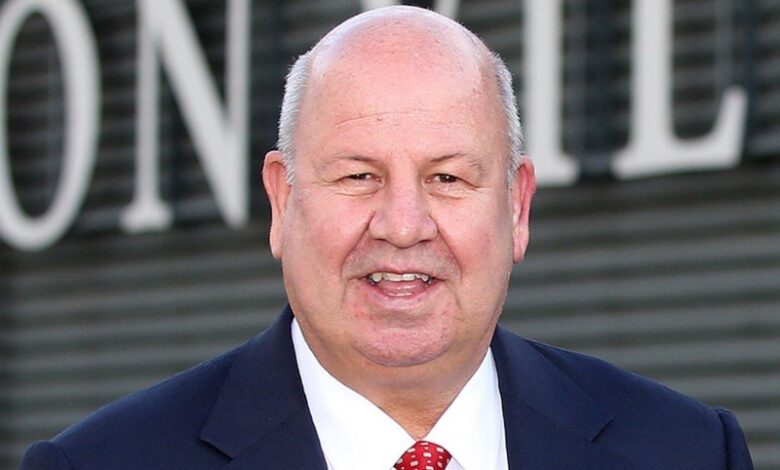Keith Wyness: A Trailblazer in Sports, Leisure, and Media Consultancy

Keith Wyness, a name synonymous with success and innovation across multiple industries, has made an indelible mark in the sports, leisure, and media sectors. From his early days in the aviation industry to his high-profile roles in football clubs, and now as a consultant, Wyness’s career is a testament to his ability to lead, innovate, and adapt in diverse environments. This article explores his journey, significant accomplishments, and the profound impact he has had on football clubs like Everton and Aston Villa.
Early Life and Education
Keith Wyness was born on October 26, 1958, in Aberdeen, Scotland. He developed a keen interest in economics and business at an early age, leading him to pursue a Bachelor of Arts in Industrial Economics at Nottingham University. His academic background in economics would lay the foundation for his future ventures in both business and sport. Armed with a solid understanding of industrial economics, Wyness would go on to revolutionize several industries through visionary leadership.
The Journey Begins: British Airways and Radisson Cruises
Wyness began his professional career in the airline industry, joining British Airways shortly after graduating. His remarkable rise within the company saw him become the youngest Vice President in the airline’s history. In this capacity, Wyness worked on the prestigious Concorde marketing team and played a crucial role in the development of the British Airways frequent flyer program. One of his standout achievements was the creation of the 16-24 Jet Club, which aimed to attract younger passengers to the airline, competing directly with the innovative Laker Airways.
In his early career, Wyness also foresaw the potential of the cruise industry. He partnered with a colleague to design the world’s first twin-hull cruise ship, specifically for the incentive market. His vision attracted Radisson as a partner, and together they raised $125 million to build the ship. After selling the ship to Radisson, Wyness and his team aimed to acquire Cunard, raising $665 million in the process, but narrowly lost out in the bidding competition.
Shifting Focus: The Sydney 2000 Olympics
In 1995, Wyness’s career took a dramatic turn as he was asked to lead the creation of the Sydney 2000 Olympic Club. Working with the International Olympic Committee (IOC), the Australian Olympic Committee (AOC), and the Sydney Organising Committee for the Olympic Games (SOCOG), Wyness spearheaded a project that would engage the Australian public with the Olympics in the two years leading up to the event. As Managing Director, he executed this project, which was regarded as a test case for future Olympic Games. The success of the Sydney 2000 Olympic Club, which attracted widespread public participation, reinforced Wyness’s reputation as a visionary leader.
Entering the World of Football: Aberdeen FC and Everton FC
Wyness’s transition into football came in 2000 when he became the CEO of Aberdeen FC. His time at Aberdeen was marked by efforts to stabilize the club financially and operationally. Wyness introduced performance-based contracts for players, ensuring that the club could maintain a competitive edge while staying within budget. These innovative approaches were integral to securing the financial health of the club during challenging times.
In 2004, Wyness took on the role of CEO at Everton FC, one of the Premier League’s most storied football clubs. His impact at Everton was substantial, particularly in terms of financial management. Under his leadership, the club adopted a series of cost-saving measures, including outsourcing catering and retail operations, which helped transform a £1.5 million loss into a £800,000 profit. Additionally, Wyness was responsible for overseeing the development of Finch Farm, the club’s modern training facility, which played a pivotal role in the club’s player development and operational efficiency.
Wyness’s time at Everton was also marked by his ambitious plans for the club’s future. His strategic decisions laid the groundwork for Everton to become a more competitive force within the Premier League, although his tenure ended in 2009, following a period of financial restructuring and challenges.
Aston Villa FC: A Tumultuous Tenure
In 2016, Wyness took on the role of CEO at Aston Villa FC, a club in financial turmoil at the time. Wyness was brought in to stabilize the club and guide it through a difficult period. His leadership was focused on reducing the club’s debt and streamlining its operations. However, his time at Aston Villa was overshadowed by internal financial disputes, which led to his departure in 2018.
Despite these challenges, Wyness’s legacy at Aston Villa includes a number of strategic initiatives aimed at restoring the club to financial health. His leadership was instrumental in navigating the complex financial landscape of one of England’s most historic football clubs, and while his tenure was brief, his impact was felt long after his departure.
Transition to Consultancy: Individual Strategies Limited
After his stint at Aston Villa, Keith Wyness transitioned into consultancy, founding Individual Strategies Limited in 2018. His consultancy firm specializes in providing strategic advice to sports clubs, media companies, and leisure organizations. Leveraging his extensive experience in football and business, Wyness helps organizations optimize their operations, increase profitability, and plan for long-term growth.
As CEO of Individual Strategies Limited, Wyness continues to work with elite clubs and organizations, offering them invaluable insights into maximizing their revenue potential. His ability to adapt his expertise to meet the ever-changing demands of the sports and leisure industries has cemented his reputation as a sought-after consultant.
Keith Wyness: Everton and His Legacy in Football
One of the most significant chapters in Keith Wyness’s career was his time at Everton FC. As CEO, Wyness’s work was instrumental in improving the financial stability of the club. His efforts in cutting costs, streamlining operations, and improving player development infrastructure contributed significantly to Everton’s success during his tenure. The development of Finch Farm, for example, was a major milestone for the club, providing a world-class training facility for future generations of players.
Despite his successes at Everton, his time at the club was not without controversy. There were concerns about the club’s long-term direction, and his eventual departure in 2009 marked the end of an era. However, the impact of his leadership at Everton can still be seen in the club’s modern infrastructure and financial strategies.
Conclusion: A Visionary Leader
Keith Wyness’s career is a testament to his ability to lead and innovate across a range of industries. From the world of aviation to the cruise industry, and then into the heart of football, Wyness has demonstrated a unique ability to think strategically and execute his ideas to success. His leadership at Aberdeen, Everton, and Aston Villa has left a lasting impact on each club, and his current work as a consultant ensures that his legacy will continue to shape the future of sports and leisure industries for years to come.
Whether through transforming football clubs or providing consultancy services to organizations, Keith Wyness’s career serves as a blueprint for visionary leadership and strategic foresight in the ever-evolving sports and leisure sectors.



